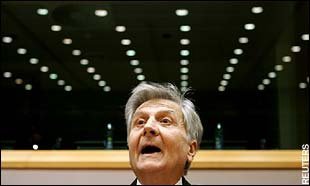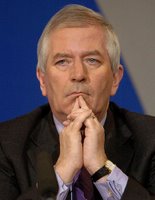 Illustrative of the stresses that are building up in the EU, the European Central Bank yesterday has raised euro interest rates a quarter point to 2.5 percent, setting off a storm of protest in Italy.
Illustrative of the stresses that are building up in the EU, the European Central Bank yesterday has raised euro interest rates a quarter point to 2.5 percent, setting off a storm of protest in Italy.There, the Berlusconi government accused the ECB of "monetary masochism" and warned that its fragile recovery could stall again after zero growth in 2005. Worse still, the Northern League, part of the ruling coalition, said it was stepping up a drive for a return to the lira.
This is according to Ambrose Evans-Pritchard in The Telegraph, who also reports that the ECB president, Jean-Claude Trichet, is entirely indifferent to the plight of Italy.
Since its inception, the ECB has been concerned only with controlling inflation and Trichet is saying that the bank was "ready to do whatever is necessary'' on this front. And, with Eurozone inflation remaining at 2.2 percent, most experts predict further rate rises in the coming months.
Italy's big problem is that its own internal inflation continues and it is losing competitiveness against Germany at a rate of 3 percent a year. With a debt of 108 percent of GDP and rising, it faces serious problems with tightening rates and debt levels are expected to "go through the roof."
In the past it has resorted to devaluations to regain lost competitiveness but, with the "one-size-fits-none" single currency, it now faces, on the brink of a general election, the bleak prospect of deflation to claw back lost ground against Germany.
Meanwhile, back in Brussels, Ambrose reports, the EU commission is belatedly trying to reassert its authority in a bid to check the slide towards economic nationalism in the so-called "take-over war".
 After first denying that the French action was illegal, and then declaring that the commission needed a formal notification from one of the parties before acting, Charlie McCreevy, the single-market commissioner, is now saying that the French government may, after all, have breached EU law by orchestrating the merger of Suez and Gaz de France to scupper the takeover by Italy's Enel. Yesterday, he wrote to Paris demanding an explanation - the first step towards legal action.
After first denying that the French action was illegal, and then declaring that the commission needed a formal notification from one of the parties before acting, Charlie McCreevy, the single-market commissioner, is now saying that the French government may, after all, have breached EU law by orchestrating the merger of Suez and Gaz de France to scupper the takeover by Italy's Enel. Yesterday, he wrote to Paris demanding an explanation - the first step towards legal action.EU lawyers are also drawing up a response to a new Spanish decree, widely denounced as a move to block a possible take-over of the Madrid electricity group Endesa by Germany's E.on, where last-minute clauses appear to give Spain's energy commission sweeping powers to block mergers. Madrid's El Mundo newspaper suggested that the plan was to shut out E.on on security grounds, purportedly because the German group relies on gas from Russia, while Endesa depends on Algerian gas.
Nevertheless, McCreevy is not going to have an easy time of it. Both the Spanish and French governments are in a rebellious mood and the French are already planning measures to block further foreign take-over bids. More than ever before, the commission is on the back foot, and the grand dream of European integration is looking distinctly jaded.
COMMENT THREAD
No comments:
Post a Comment
Note: only a member of this blog may post a comment.